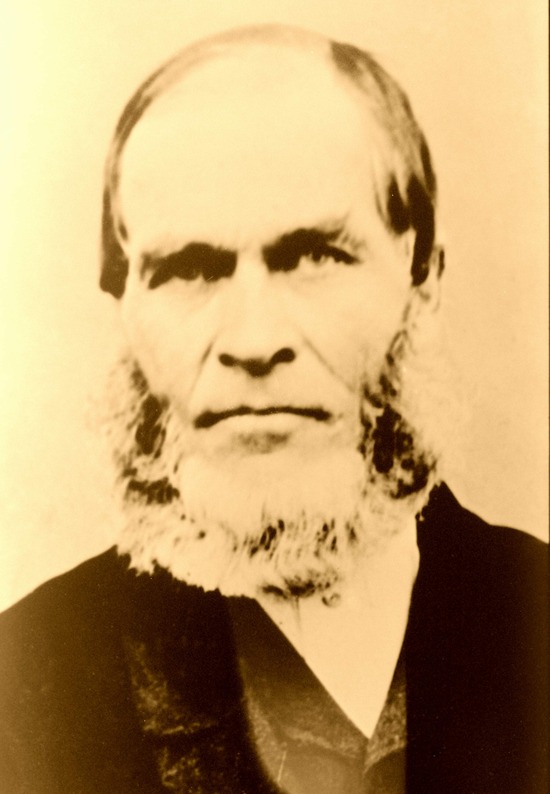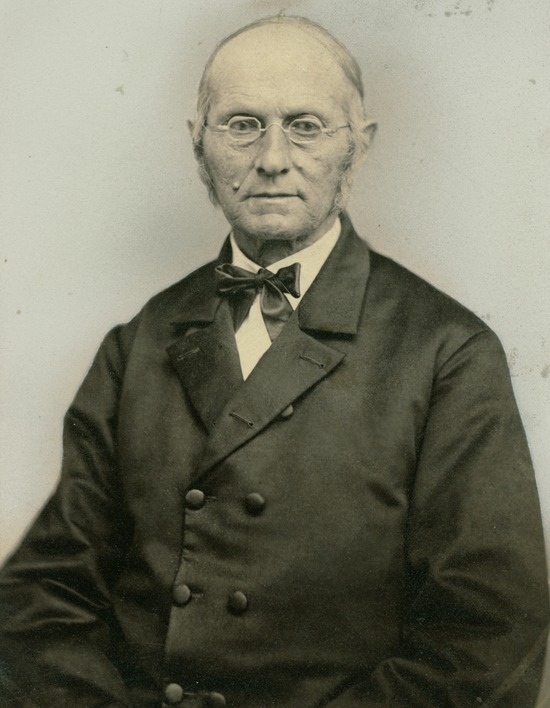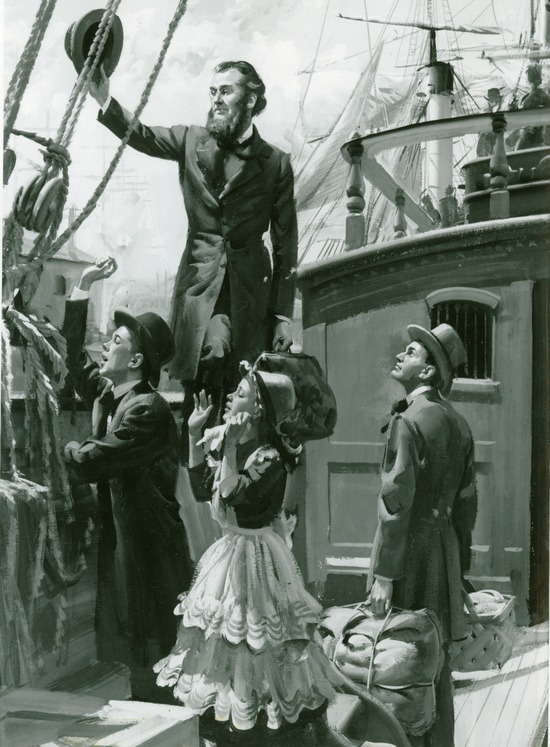Key Figures in the Founding of the Seventh-day Adventist Church
The key figures and founders of Seventh-day Adventism were a group of people from various Protestant Christian denominations who were committed to studying the Word of God and sharing about Jesus Christ.
Though concentrated on the east coast of the United States, the movement didn’t remain there long. These individuals had a vision for a diverse worldwide movement that would reach across cultures and languages and result in connected congregations across the globe.
The Holy Spirit working through their efforts has done just that.
We’ll learn more about the lives of these ordinary yet devoted figures in the Adventist Movement:
Lots to cover! So, let’s begin with a man who emerged on the scene shortly after the Second Great Awakening of the early 19th century.
William Miller

Courtesy of the Ellen G. White Estate, Inc.
Initially known as the man who spurred the curiosity surrounding the second coming of Christ, William Miller was an American Baptist preacher and one of the forerunners of the Seventh-day Adventist Church.
Before becoming a devoted Bible scholar, Miller was a deist. After returning from serving in the War of 1812, however, he became anxious about the concepts of death and the afterlife.
He turned to the Bible for answers.
While studying his Bible, he learned much more than he ever thought he would. His memoir records how he found Scripture to contain “principle so perfectly adapted to the wants of a fallen world” and that “in Jesus I found a friend.”1
As Miller began to preach and publish information about the Second Advent, he and many of his followers, known as Millerites, were mocked openly and became unwelcome in their Christian churches.
So they went on to form the Millerite Movement, which focused on the truths they learned from their studies. They came to believe that Jesus would come in 1843 or 1844, and some of his followers eventually settled on October 22, 1844, as the exact date.
When Jesus didn’t return, the day became known as the Great Disappointment.
This set them back a bit. But they weren’t going to give up easily.
Many of his followers dove back into the Bible, back into the prophecy of Daniel 8:14. They knew the 2,300-day prophecy meant something, just not the coming of Christ.
Though Miller was wrong about the timing of the Second Coming, it spurred his followers (some of whom we’ll cover next) to start the Seventh-day Adventist Church, a movement that would continue to prepare the world for Christ’s return.
Hiram Edson

Courtesy of the Ellen G. White Estate, Inc.
Hiram Edson is perhaps best known in the Adventist Movement for his role in uncovering why Jesus didn’t come on October 22, 1844. And throughout the rest of his life, he encouraged and guided others to the truths in the Bible.
So how did he help unravel the Great Disappointment?
On October 23, as believers were reeling from their disappointment, Edson, a Millerite leader in his area, got a distinct impression that he needed to “encourage the brethren.”2
After praying with a small group of believers, he and a fellow Millerite, O.R.L. Crosier, set off through a cornfield to visit his neighbors.
But suddenly, Edson stopped.
“Brother Edson, what are you stopping for?” Crosier called out.
Edson responded, “The Lord was answering our morning prayer.”3
He shared how the Holy Spirit impressed him that Jesus wasn’t supposed to come to the earth on October 22, 1844. Rather, Jesus had begun an important work, known as the Investigative Judgment, in the Most Holy Place of the heavenly sanctuary.
This impression spurred Edson, along with Crosier and another individual named F. B. Hahn, to study the prophecy in Daniel that William Miller had studied. As they did so, they saw its connection to Jesus’ heavenly ministry (Hebrews 8 and 9).4
In 1846, Edson held a conference on his property in New York, where he shared what he had uncovered and met other Millerites who eventually started the Adventist Church.
Though he continued to work as a farmer throughout his life, spreading the gospel was always uppermost in his mind. He financially supported the church in every way he could.5 And he also went on evangelistic tours throughout New York and even up to Canada with other leaders in the Adventist Church, like Joseph Bates and J. N. Andrews.6
He received an honorary ordination to the ministry sometime between 1866 and 1875,7 but his life is truly an example of a layperson who committed to spreading the gospel in whatever ways he could.
Joseph Bates

Courtesy of the Ellen G. White Estate, Inc.
Joseph Bates was a powerhouse in the Adventist Church, traveling—often on foot—from city to city to preach. He was involved in many leadership roles within the church and wrote on numerous biblical subjects, including the seventh-day Sabbath.
But before becoming an Adventist preacher, Joseph Bates spent many years out at sea. During this time, he began to read the Bible—a New Testament slipped into his suitcase by his wife. The little book changed his life, and he committed his life to God.
When he retired from the sea at age 35, he had a small fortune of $11,000—worth nearly $328,000 today.
After leaving the sea, Bates learned about William Miller and his teachings. He began working with Miller to educate people on the truths Miller and his followers had discovered. Despite the Great Disappointment, his faith in God didn’t waver.
In fact, he believed in the Advent Movement so much that he ended up putting his entire life’s savings—all $328,000 worth—toward its growth.
In 1846, Bates wrote a piece about the biblical seventh-day Sabbath and how it’s one of the ten commandments that has been forgotten by the Christian world. James and Ellen White read his article and, from it, decided to become “Sabbatarian Adventists.”
Along with James and Ellen White, Joseph Bates is one of the co-founders of the Seventh-day Adventist Church.
We’ll learn about James and Ellen White next.
Ellen G. White

Courtesy of the Ellen G. White Estate, Inc.
Ellen White, recognized as having the biblical gift of prophecy, helped start and organize the Adventist Church. As it grew, she supported and guided its leadership, health and medical work, educational work, and worldwide missions. She was also a prolific writer, writing nearly 100,000 pages during her lifetime.
Without a shadow of a doubt, the Bible is the foundation of the Adventist faith. And everything Ellen White wrote was to make sure church leadership did not stray from the guidance of Scripture.
Through her writings, she provided the great controversy framework, which helped people see the Bible through the lens of a battle between Christ and Satan. She also sought to help people apply God’s Word to their daily lives in a practical way—no matter what denomination a person claimed.
All of Ellen White’s counsels and admonitions were documented and compiled into what is known today as the EGW Writings. These are managed by the trustees of the EGW Estate in Silver Spring, Maryland, and they remain relevant and of great value to the church.
James White
James White—Ellen White’s husband—was active in the Millerite Movement and, after the Great Disappointment, helped start the Adventist Church. He was a key proponent of organizing the General Conference of Seventh-day Adventists and played an integral role in founding other institutions.
The first Adventist school, health center, and publishing house were all started by him.
His personal health issues were what spurred the organization of an Adventist medical system. After receiving medical care while recovering from a stroke, he and his wife realized the help wasn’t what it could be. In response, they established the Battle Creek Sanitarium.
In addition to the health work, James White was involved in publishing, together with his wife. His first publication was The Present Truth, and it quickly became an effective gospel-spreading method. This periodical later became known as the Adventist Review and still circulates today.
The success of the Adventist Church in various witnessing methods—education, healthcare, and literature—can be attributed to James White’s tireless efforts.
J. N. Andrews

Courtesy of the Ellen G. White Estate, Inc.
John Nevins Andrews was an earnest Bible student who devoted his life to God’s work and contributed in many ways to Adventist theology. He spent many years writing and editing for Adventist publications, eventually taking the publishing work to Europe as the first Adventist missionary.
It all started when at age 12, Andrews learned about the Millerite Movement and excitedly awaited Jesus’ coming. The Great Disappointment was a big blow for him.
While struggling to know how to proceed, he learned about the seventh-day Sabbath and began to keep it. A few years later, in 1849, he met James and Ellen White and Joseph Bates, who directed him to the Bible and helped him understand what had really occurred on the day of the Great Disappointment.
At 20 years of age, he devoted himself to God’s work in numerous ways.
His earnest Bible studies led him to publish books, including an in-depth look at the history of the Sabbath. He also used his writings to support Ellen White’s writings, and together, they worked to spread the good news of Christ.
Later on, when the Adventist Church was officially established, he held the role of president of the General Conference for a time. He was also an editor of the Adventist Review.
As Seventh-day Adventist beliefs spread throughout America, Andrews knew that wasn’t enough.
If Christians were supposed to share the three angels’ messages with the whole world, then he needed to do just that. So he went to Switzerland, helping to lead the church in Europe, provide ministerial training, and establish Adventist publishing there.
Andrews’ mission work not only began the globalization of the Adventist Church but also helped grow the kingdom of God.
Today, Andrews University in Berrien Springs, Michigan—the first Adventist university—is named after J. N. Andrews in recognition of his efforts.
The Adventist Church today
Thanks to the work of Miller, Edson, Bates, the Whites, Andrews, and many others, Adventism flourished all around the world.
In the late 1870s, the church only had 16,000 members.
Twenty years later, in 1901, the worldwide membership count totaled 75,000.
Today, there are more than 20 million local church members, as well as 8,000+ schools, 100+ hospitals, and 50+ publishing houses.
With its fundamental beliefs firmly founded in biblical truth, the Adventist Church continues to grow, learn, and share the gospel with the world. The expansion of the Adventist Church hasn’t stopped…and it won’t until Christ returns to take us home.
Related Articles
- Bliss, Sylvester, Memoirs of William Miller (Joshua V. Himes, Boston, MA, 1853), p. 65. [↵]
- “The Voice of God,” Lest We Forget, vol. 3, p. 2. [↵]
- “Hiram Edson,” Adventist Learning Community. [↵]
- “The Voice of God,” Lest We Forget, vol. 3, p. 2. [↵]
- “Hiram Edson: Chosen instrument,” Lest We Forget, vol. 3, pp. 4–6. [↵]
- “Hiram Edson: The Farmer in the Cornfield,” Lineage. [↵]
- Ibid. [↵]
Questions about Adventists? Ask here!
Find answers to your questions about Seventh-day Adventists
More Answers
The Health Benefits of Fresh Air You Should Know About
The Health Benefits of Fresh Air You Should Know About“When you can’t breathe, nothing else matters,” the American Lung Association tells us. And while that’s true, the kind of air you’re breathing will determine the health benefits you experience. Breathing fresh...
What Do Seventh-day Adventists Choose to Eat?
What Do Seventh-day Adventists Choose to Eat?Food blogs overwhelm the internet; food fads are all the rage; and copycat and healthy versions of food are the subject of many a get-together. Eating—and eating the best way—is a big deal. And everybody has a different...
10 Incredible Ways Sunlight Can Improve Your Health
10 Incredible Ways Sunlight Can Improve Your HealthAre you concerned about sunlight’s negative effects? You might be the one who lathers on the sunscreen and covers up when you go outside. Or maybe you avoid being outside as much as possible. You might be surprised,...
Why Is Water So Important?
Why Is Water So Important?We all know that water is a substance we can’t live without. It quenches our thirst and keeps us hydrated on the inside. And it’s necessary for hygiene and cleansing on the outside too. But did you know that the cleansing properties of water...
Ellen White’s Writings and the Adventist Health Message
Seventh-day Adventists are known for their emphasis on healthy living. And Ellen G. White was a significant influence in the development of this priority and practice among Adventists.
Health Clinics
Ellen White and Adventist Healthcare—Ahead of Their Time Medical care in the mid-1800s was primitive, to say the least. Basic concepts we take for granted—such as proper handwashing or recognizing the dangers of bloodletting—were nonexistent. And doctors often had...
What Did Ellen White Teach about Vegetarianism?
What Did Ellen White Teach about Vegetarianism?One thing you might have heard about Seventh-day Adventists is their emphasis on a vegetarian lifestyle. If you’re wondering why that is, it goes back to our church’s humble beginnings: As Adventists studied the Bible,...
How Ellen White’s Teachings Can Improve Your Health
How Ellen White’s Teachings Can Improve Your Health Healthcare in the nineteenth century was said to leave “more disease than it took away” with its use of bloodletting and “medicines” like mercury and arsenic.1 As people questioned these methods, new approaches...
Change Your Perspective on Life with These 5 Mindsets
5 Biblical Mindsets to Change Your Life for the Better Sometimes, life is just plain hard. There’s no way around it. So would thinking about things differently really change anything? Our perspective on life, and everything it throws at us, affects more than we’re...
Bible Promises for When You’re Worried or Fearful
Bible Promises for When You’re Worried or Fearful The Bible is full of beautiful promises that can comfort us in a variety of situations. They can give us hope when we are hopeless, make us feel grateful for God’s love, and comfort us when we’re grieving or suffering....
12 Practical Ways to Overcome Worry
12 Practical Ways to Overcome Worry DISCLAIMER: This content is for informational purposes only. It does not constitute any professional medical advice and is not intended as a substitute for professional mental health therapy. It’s easy to get stuck in a cycle of...
How the Bible Talks About Worry, Fear, and Anxiety
How the Bible Talks About Worry, Fear, and Anxiety Worry and fear are the ingredients of anxiety. It’s easy to see how the world isn’t perfect—and the anticipation of a bad event or experience (that may or may not even happen) can end up draining the peace and...
How to Calm Anxious Thoughts, Using the Bible
How to Calm Anxious Thoughts, Using the Bible You were expecting a phone call from your daughter half an hour ago, and she still hasn’t called. She’s also not answering your calls. You feel your heart thumping as your thoughts race: What if she’s been in a car...
What You Should Know About the Adventist Health Studies
What You Should Know About the Adventist Health StudiesYou may have heard that Seventh-day Adventists care about health. But what you may not know is that Adventists have been the subjects of long-term research into lifestyle and health. Since 1958, researchers from...
Benefits of Sunlight
Yes, There Are Health Benefits of SunlightDespite the bad reputation it’s gotten, sunlight is generally associated with positivity, as shown by songs like “You Are My Sunshine,” or phrases that refer to delightful people as having a “sunny disposition.” There’s a...
Why Your Body Needs Rest for Optimal Health
Why Your Body Needs Rest for Optimal HealthStruggling to think straight? Wondering why you can’t remember that important tidbit you heard earlier today? Feeling like your emotions are about to explode? These are just some of the symptoms that can reveal your need for...
The Seventh-day Adventist Diet: One of Our Key Longevity Secrets
The Seventh-day Adventist Diet: One of Our Key Longevity SecretsOats, avocados, lentils, tofu—probably not what you first think of in a standard American diet. But if you show up at the home of an Adventist, chances are you may be served one of these staples. Out of a...
Why You Need Fresh Air
Why You Need Fresh Air“When you can’t breathe, nothing else matters,” the American Lung Association tells us. We couldn’t agree more! Breathing in clean air is an essential part of caring for our bodies, which God has given us. Together with other health principles,...
Sabbath Meal
Everything You Need to Know About Sabbath MealsFor Seventh-day Adventists, sharing a Sabbath meal with friends and family is one of the most special and memorable parts of the Sabbath. That’s why we want to share with you all about Sabbath meals and why they’re such a...
Adventists and Healthy Living
Adventists and Healthy LivingWhat’s the Adventist “Health Message” All About? One thing Seventh-day Adventists are known for is their emphasis on living healthy lives. Since our bodies are living temples of the Holy Spirit (1 Corinthians 6:19, 20), we strive to stay...
Water’s Importance—Physical Benefits and Spiritual Applications
Water’s Importance—Physical Benefits and Spiritual Applications We all know that water is a substance we can’t live without. Not only does it quench our thirst and keep us hydrated from the inside, but it’s necessary for hygiene and cleansing on the outside as well....
How Important is a “Day of Rest?”
How Important is a “Day of Rest?” Why God Created a Day for Downtime by Martin Casper Do you ever experience the feeling of complete overload? Do you feel like the only way you can get ahead is by slamming it 24/7? I hear these types of comments more and more...
7 Reasons Why a Day of Rest is Important
7 Reasons Why a Day of Rest is ImportantWe live in a fast-paced world. It seems as if success is measured in how much you can do in a short amount of time. (Extra points for the service or product that is available 24/7). The idea that we will be more successful if we...
How do Adventists choose what to eat?
How do Adventists choose what to eat?Every day, parents go through the ritual of getting their kids to eat what is healthy and good while trying to steer them away from what can hinder the growth of their developing bodies. Nutritionists work with their clients to...
How Can I Have a Better Marriage?
Is it possible to have a happy marriage?
How do Adventists make movie and music choices?
How do Adventists make movie and music choices?Cinema has come a long way since the first clips of motion pictures came to light in 1878. As the decades rolled on, film and music producers have created rivers of movies and albums for the masses. Today, watching movies...
Why are many Adventists Vegetarian?
Why are many Adventists Vegetarian?The diet intended for man is outlined in Genesis 1:29, “And God said, ‘See, I have given you every herb that yields seed which is on the face of all the earth, and every tree whose fruit yields seed; to you it shall be for food.’”...
Didn’t find your answer? Ask us!
We understand your concern of having questions but not knowing who to ask—we’ve felt it ourselves. When you’re ready to learn more about Adventists, send us a question! We know a thing or two about Adventists.






















